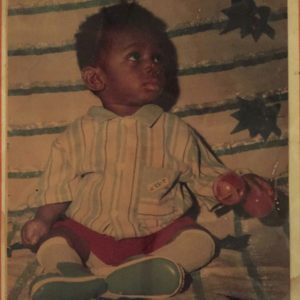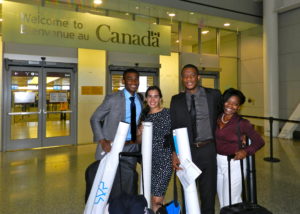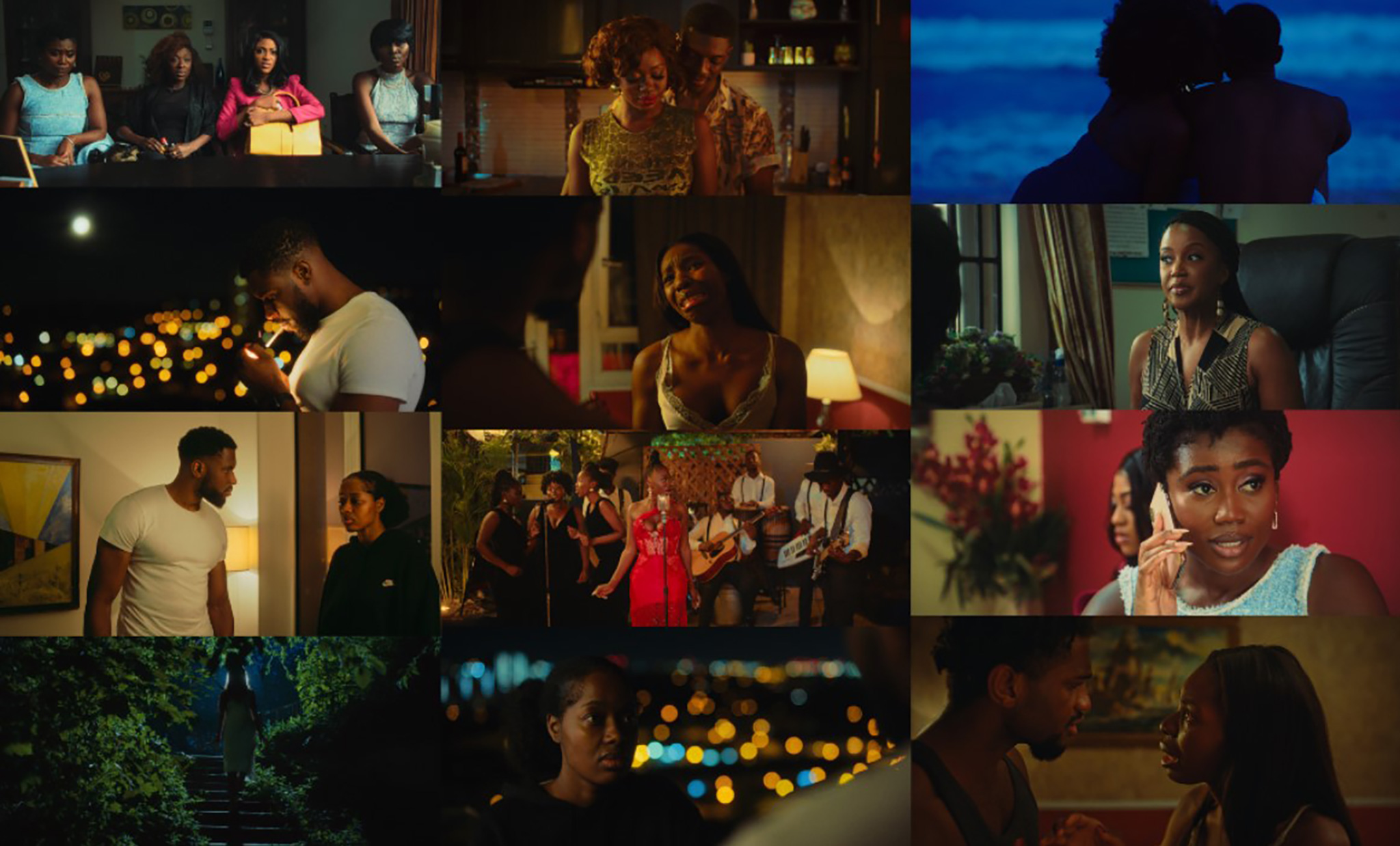
Uche Aguh – Race, identity, finding home and the journey to self discovery.

 My name is Uche, I am 26. I was born and raised in Port-Harcourt, Rivers State, Nigeria, where I attended Nursery, Primary, and a bit of Secondary school. My father worked for The Royal Dutch Shell Oil Company, as a Mechanical engineer and my mom was a Secondary School-Teacher (Agriculture) and in her later life, a fierce Building development and construction manager. I have four siblings. I am the middle child. We were raised in a traditional Igbo-Catholic household. I received my first holy communion at seven, I had no idea what was going on, but I had on my best white outfit, a candle and everyone was watching myself and the rest of the other kids. I enjoyed the performance, thoroughly. When I was ten, my family visited Dallas, Texas for a Christmas Holiday, on a Visa Lottery we had won. When it came time to leave at the end of the holiday, I complained to my parents that school back in Port-Harcourt (JSS2, Brainfield College) had already been in session for roughly three weeks (more like a week) and so essentially, I’d be unable able to catch up, presenting them with the ultimate solution of leaving me in Dallas to start over. What I had configurated in my ten year old head as a witty ploy which would never materialise, was somehow, already on their agenda. I was left in Dallas with my oldest sibling, who was at the time of college age, while the rest of the family went back to Port-Harcourt.
My name is Uche, I am 26. I was born and raised in Port-Harcourt, Rivers State, Nigeria, where I attended Nursery, Primary, and a bit of Secondary school. My father worked for The Royal Dutch Shell Oil Company, as a Mechanical engineer and my mom was a Secondary School-Teacher (Agriculture) and in her later life, a fierce Building development and construction manager. I have four siblings. I am the middle child. We were raised in a traditional Igbo-Catholic household. I received my first holy communion at seven, I had no idea what was going on, but I had on my best white outfit, a candle and everyone was watching myself and the rest of the other kids. I enjoyed the performance, thoroughly. When I was ten, my family visited Dallas, Texas for a Christmas Holiday, on a Visa Lottery we had won. When it came time to leave at the end of the holiday, I complained to my parents that school back in Port-Harcourt (JSS2, Brainfield College) had already been in session for roughly three weeks (more like a week) and so essentially, I’d be unable able to catch up, presenting them with the ultimate solution of leaving me in Dallas to start over. What I had configurated in my ten year old head as a witty ploy which would never materialise, was somehow, already on their agenda. I was left in Dallas with my oldest sibling, who was at the time of college age, while the rest of the family went back to Port-Harcourt.
“I was in America, the land of opportunity, with a big task on my ten year old shoulders- become a Medical Doctor.”
Going to Middle School and High School in a foreign country as the kid with the thick African accent who wore funny clothes wasn’t always easy at times, but my books became my best friends. And not just required text books, but novels. Reading was my escape. I enjoyed all genres of novels.
At the cost of missing birthdays, anniversaries, and milestones in the lives of my immediate family members, I was in America, the land of opportunity, with a big task on my ten year old shoulders- become a Medical Doctor. My parents, noticing my acute excellence in the sciences and heeding desperately to the very many detailed and revealing premonitions of prayer men all around the Eastern Villages of Mbaise, Imo state (My Ancestral Hometown), had already decided that at the tender age of five, I would be the doctor of the family. And so, that was the plan. My father never referred to me by my name growing up. He simply called me, doc. It was endearing.
“the sort of aunt who decorated her English with a fanciful accent that wasn’t quite traceable”
My books were my best friends. I was separated from my oldest sibling, who lived in a remote part of town with a different relative in Dallas, Texas. I lived with my Aunt UK, who when I was Seven, had proposed marriage to, because she was the aunt who would travel back from America with all sorts of gifts, sweets and things of that kind; the sort of aunt who decorated her English with a fanciful accent that wasn’t quite traceable, but it wasn’t African, and that was all that truly mattered. Her lipstick was redder, her hair bigger, her shoes, higher, she was American. She was beautiful, and I wanted to marry her. In the years between my intentioned marriage proposal and my now living with her and her husband, many things had changed.
Many things had transpired that my now eleven year old self couldn’t readily comprehend. There was a striking difference about her. Her lipstick wasn’t as red anymore, her hair wasn’t always kept, and her shoes were flat, but her accent- it remained fancifully decorated. She was a nurse working three jobs to keep food and rent afloat. She had issues bearing children, but God blessed her with two beautiful boys. There was a silent tension in her marriage, even I could see that as young as I was. Her husband wasn’t entirely fond of me. He hated the idea that me, as rich as my father was in Nigeria, was now living in his house (Read: My Aunt’s house as he did mostly nothing). But it was America! This was the land of opportunity. I was the kid in Home Alone, I was Eddie Murphy, it didn’t matter what emotional abuse, and physical torture I suffered in that sullen two bedroom apartment, where I laid every night in the living room floor to sleep. My bed- a blanket. It didn’t matter, that I was now the houseboy, going to school and then coming home, to take care of my two small cousins. None of that mattered because I was in America and all my friends from back home would be jealous. BB, Dumbi, Eche, Kazeem, even Clive who was biracial, or as we used to so insensitively say back then, half-caste. I knew they would all be profoundly jealous. And so I was fine with the abuse.
 I found theatre to be an outlet, as I grew into an older Non-American black. I believe I was fourteen, in the Eleventh grade, at Hillcrest High School, when I performed in my first ever stage production, a musical “Guys and Dolls”. I had a bit chorus part, but I absolutely loved it. The next semester I auditioned for a serious play, “The Bald Soprano”, by Eugene Ionesco. The part required a British accent. I had never heard a British accent before, but I was determined to have the part, so I watched the “Sound of Music”, and I imitated what I heard. I got the role as the fire-chief who boldly comes into the home of a couple, entertaining another couple, to warn them about something or the other, regarding a fire. I honestly don’t remember the plot, it was so many years ago. The play was a bizzare, whimsical play which had no real string of thought or concept whatsoever. In a rehearsal, with my director, Ms. Hayslip, who I credit for all my success in acting, there was a kissing scene to be staged between myself and one of the other characters, played by a girl, Lauren. She refused to kiss me in the play, stating that she was uncomfortable with the idea. (Interesting to me as I remember her having no difficulty kissing Clayton in the musical the semester prior) Lauren was white, as was Clayton. The play opened to moderate success. Everyone in the company was awarded at the district level competition, except me. I was saddened.
I found theatre to be an outlet, as I grew into an older Non-American black. I believe I was fourteen, in the Eleventh grade, at Hillcrest High School, when I performed in my first ever stage production, a musical “Guys and Dolls”. I had a bit chorus part, but I absolutely loved it. The next semester I auditioned for a serious play, “The Bald Soprano”, by Eugene Ionesco. The part required a British accent. I had never heard a British accent before, but I was determined to have the part, so I watched the “Sound of Music”, and I imitated what I heard. I got the role as the fire-chief who boldly comes into the home of a couple, entertaining another couple, to warn them about something or the other, regarding a fire. I honestly don’t remember the plot, it was so many years ago. The play was a bizzare, whimsical play which had no real string of thought or concept whatsoever. In a rehearsal, with my director, Ms. Hayslip, who I credit for all my success in acting, there was a kissing scene to be staged between myself and one of the other characters, played by a girl, Lauren. She refused to kiss me in the play, stating that she was uncomfortable with the idea. (Interesting to me as I remember her having no difficulty kissing Clayton in the musical the semester prior) Lauren was white, as was Clayton. The play opened to moderate success. Everyone in the company was awarded at the district level competition, except me. I was saddened.
The next year, I had a larger role, in the Musical, “South Pacific”, with actual singing and words, and a named character, ” Professor”. When it came time for the serious play in the Spring Semester, I auditioned vigorously. The play, “1984”, by George Orwell. I got the main role, beating out every other white actor who had auditioned. Ms. hayslip had auditioned me a total of about seven times. The next week, I turned down the role. I wasn’t able to make rehearsals, because my aunty’s husband had kicked me out of the house, transferring me to another uncle’s home, much farther in travel distance from where my school was, in fact it was out of district. It was impossible to make the rehearsals, and still make it home on time. The travel required several buses, and it just wasn’t feasible. I was saddened.
“It was in my senior year of High School, that I became acutely aware of what it meant to be black in America.”
It was in my senior year of High School, that I became acutely aware of what it meant to be black in America. Now, because of my interests in drama, theatre, and Academic decathlon (A competition for subject based academic trivia), Black- Americans did not like me. I took all Advanced classes with the majority of my classes being populated by white people. I was too “white” to be “black”, according to Black Americans. The white students didn’t accept me either, I was too “African” to be “black”, which was acceptable to them, in moderate doses. I had a few friends, decent people I always assumed. We took the same classes, and did the same things after school. There was Josue, who was Hispanic, and Josh, white. Then Gupreet, who was Indian. And of course, me, Nigerian. The United Nations of companions. What could possibly go wrong?
“And at the time, I desperately wanted to be anything but African.”
On the eve of the beginning of our very last semester of High School, Gupreet and Josue were arrested for vandalising school property. Spray painting, the message- “Brian Aguh is not black”, on the wall facing the track field. The message “Waynie Tesfai is an Oreo” was also spray painted, so I was not alone. I was not the sole victim in these racial microaggresions of bored teenage boys. An Oreo refers to a black person, as is evident, dark on the outside, but inside, they are white. Black appearing, white acting. Back to me– “Brian Aguh is not black”– My middle name is Brian, it was easier than Uchenna, or even Uche. And at the time, I desperately wanted to be anything but African. I was the kid who would say, my parents are Nigerian, when I was asked where I was from. I had borrowed an American accent, which to my surprise, had become less of a borrowed good, but eventually, a stolen property, never to be returned. You see, at ten, my vocal cords were still immature, on a cellular level, and so they, adapted to the environment of their new home.
“Josue committed suicide years later, unrelated to the event I am sure.”
“Brian Aguh is not black”– Surely, it was meant to be a joke, I thought to myself. I was indeed, not “black”, I didnt’ do any of the things that most of the black kids did in High School. I didn’t play sports, or run track, or play music in the band. I was in theatre and academic competitions. That is as white as it gets. And a part of me was strangely happy with that. Gupreet and Josue got arrested. They were bailed by Ms. Ashmead, our Academic Decathlon instructor, who never spoke to me again after that. They both got expelled, and lost all their scholarships to colleges. Gupreet was number one in our class, per rank. Now that he was gone, I went from number eleven to ten, in a graduating class of about five hundred. I had already been accepted to the University of Texas at Austin, the Harvard of the South, as we like to call it. But my new rank, thanks to my not being black in the eyes of my former friends, granted me scholarships. I went to college in Austin, and I ran into Gupreet on a few occasions, but we never exchanged words. We simply traded our sadness for the other’s– a lost friendship, a dismantled financial aid. Josue committed suicide years later, unrelated to the event I am sure. Josh, the only one who wasn’t implicated married Lauren who refused to kiss me in the play.
I had a great High-School experience.
“I declared a name change on Facebook, and my name reverted back to “Uche”


College was better. It was in College I discovered the “African Students Association”, and seeing how proud these American born Nigerians were of their names, Lande, Emeka, Tolu, Kunle, Gbemi, Funto, etc.
I couldn’t understand why me, who was actually born in Nigeria was still using “Brian”. In the fall of 2006, I declared a name change on Facebook, and my name reverted back to “Uche”.
My college experience was amazing. I realised I was racist towards “Black Americans”. This was how the Nigerian in American society had groomed me to think, and my experiences in Middle and High School, didnt help either. I vehemently refused this notion, and decided to join a black fraternity, “Kappa Alpha Psi”- the best decision I made in college. I had Black-American friends, African friends, White friends, and even Asian friends, UT was practically half Asian. It was a beautiful experience. I lost my virginity in college, I had my first kiss in college, I went to my first dance in college. All the things kids did in High school, I discovered in college. I graduated at twenty with a degree in Biology, and a Business Foundations Minor.
“Medical School was the worst thing I ever did in my life.”
 After College, I did a Masters in Biology, and then I went to Medical School in Howard, in Washington D.C. In between my Masters and Medical School, I rekindled my love for acting. I also discovered film
After College, I did a Masters in Biology, and then I went to Medical School in Howard, in Washington D.C. In between my Masters and Medical School, I rekindled my love for acting. I also discovered film
making as I had purchased a camera that year. I thought nothing of either. I was destined to be a Pediatric Orthopaedic Surgeon. And so, I moved to D.C and careful whispers labelled me as the model turned doctor. Yes, I had a brief stint in New York as a model. Nothing serious, i’m afraid.
Medical School was the worst thing I ever did in my life. And if I said, I didn’t plan it to be this way, I’d be lying. It afforded me an entry into a special club of Black Americans- The top one percent, as W.E.B. Du Bois so eloquently put it. But it cost me, my happiness, my sanity, and my freedom. It was like a wind, with no direction, or a virulent spirit with no name. I couldn’t quite understand what was happening to me, only that it wasn’t normal. There were days I couldn’t get out of bed. My parents consulted more prayer men. I was being held by someone in the river or someone had given me something to eat– I can’t quite remember the Nollywood story they gave me.
I couldn’t quite understand what was happening to me, only that it wasn’t normal. There were days I couldn’t get out of bed. My parents consulted more prayer men. I was being held by someone in the river or someone had given me something to eat– I can’t quite remember the Nollywood story they gave me.
I completed my course work, not giving care to board exams, applications for residencies, or really having any desire to practice Medicine.
I went to Germany. I shot a short film, “I still do”, and then I moved to London to study at the Identity School of Drama.
 I didn’t stumble into Film-Making accidentally, I’m afraid. I think the universe orders up what it needs, when it needs it. And so, The universe had already decided that I would be a Film-Maker and so when it was ready for me to take that leap, I did it. I had no reservations. No hesitations, whatsoever.
I didn’t stumble into Film-Making accidentally, I’m afraid. I think the universe orders up what it needs, when it needs it. And so, The universe had already decided that I would be a Film-Maker and so when it was ready for me to take that leap, I did it. I had no reservations. No hesitations, whatsoever.
“Not that it should matter, as you should never have to explain your passion.”
 My biggest inspirations include, Sade Adu, Fela Kuti, Jean-Michel Basquiat, Kehinde Wiley, Kanye West, Nina Simone, Pete Edochie and Chimamanda Ngozi Adichie. To me, these are the most talented and progressive artists. Timeless story-tellers, who dared to be different, who dared to take that leap of faith. I read once that Chimamanda was initially in the Medical route, and to think what the world would have lost in prose, diction, syntax, and beautifully written, earth-shattering stories. To think what the world would have lost, if she had not made that leap of faith. And so I made my leap, because, it saved my life, and also, because in the future, there will be another Uche, and his or her parents would ask why they wanted to be a Film-Maker after studying Medicine, and that other Uche would say, “Because I want to”. And inevitably, as all Nigerian parents are the same, they would then ask “But, where has it been done before?” And in that moment, in that bleak moment of lost passion, that other Uche would have me as a reference point, or Chimamanda. I am in no way comparable to the genius that is Chimamanda, but in the eyes of that other Uche, we both would be tangible references to offer up to his or her parents. Not that it should matter, as you should never have to explain your passion. But we are talking about Nigerian parents; the most well-read, literate and degreed people with the smallest thinking capacity. I believe that all children, including Nigerian children should be given the space and the support to follow what is truly in their heart.
My biggest inspirations include, Sade Adu, Fela Kuti, Jean-Michel Basquiat, Kehinde Wiley, Kanye West, Nina Simone, Pete Edochie and Chimamanda Ngozi Adichie. To me, these are the most talented and progressive artists. Timeless story-tellers, who dared to be different, who dared to take that leap of faith. I read once that Chimamanda was initially in the Medical route, and to think what the world would have lost in prose, diction, syntax, and beautifully written, earth-shattering stories. To think what the world would have lost, if she had not made that leap of faith. And so I made my leap, because, it saved my life, and also, because in the future, there will be another Uche, and his or her parents would ask why they wanted to be a Film-Maker after studying Medicine, and that other Uche would say, “Because I want to”. And inevitably, as all Nigerian parents are the same, they would then ask “But, where has it been done before?” And in that moment, in that bleak moment of lost passion, that other Uche would have me as a reference point, or Chimamanda. I am in no way comparable to the genius that is Chimamanda, but in the eyes of that other Uche, we both would be tangible references to offer up to his or her parents. Not that it should matter, as you should never have to explain your passion. But we are talking about Nigerian parents; the most well-read, literate and degreed people with the smallest thinking capacity. I believe that all children, including Nigerian children should be given the space and the support to follow what is truly in their heart.

Nigerian parents, please do not drive your children to abject fear and depression. Find what they are good at, and nurture them in those spaces. And praying alone, will not cure depression.
“Living in Bondage”, “The Deadly Proposal”, and the early works of Nollywood are my most tangible reasons as to why I got started on this path. I knew there was a deeper connection for me. It was so much more than entertainment. It was a life lived, that I hadn’t quite experienced yet. It’s hard to explain, but I just knew it would be my line of work. And when it came time to dive in, I was fully ready.
“I am putting it out into the universe that I will be so lucky as to be given the opportunity to pen, and direct the script for “Americanah”

 My immediate plans are to continue to create and direct my own films via the 55Media umbrella with my producing partner, Dennis Schmitz. Also, I am putting it out into the universe that I will be so lucky as to be given the opportunity to pen, and direct the script for “Americanah”, by Chimamanda Ngozi Adichie, as it is being developed into a screen adaptation. I have a few feature films to helm within the next two years from my production company. I have a play “Into the Sambisa” which will be produced by the Identity Theatre Company in London, next year. Femi Oguns, most reputable as the agent to John Boyega (Star Wars), is the mastermind behind, all the Identity branches (The drama school, the agency and the theatre company). I am also pitching a Television series in the new year coming. I plan to keep busy.
My immediate plans are to continue to create and direct my own films via the 55Media umbrella with my producing partner, Dennis Schmitz. Also, I am putting it out into the universe that I will be so lucky as to be given the opportunity to pen, and direct the script for “Americanah”, by Chimamanda Ngozi Adichie, as it is being developed into a screen adaptation. I have a few feature films to helm within the next two years from my production company. I have a play “Into the Sambisa” which will be produced by the Identity Theatre Company in London, next year. Femi Oguns, most reputable as the agent to John Boyega (Star Wars), is the mastermind behind, all the Identity branches (The drama school, the agency and the theatre company). I am also pitching a Television series in the new year coming. I plan to keep busy.
“Yes I hold a green and blue passport. But, I am a Nigerian man through and through.”
I am inspired by the countless messages I receive privately from people, the majority of them Nigerians, detailing the ways in which my story has somehow inspired them. Inspiring people has never been my intention. But if I can live out my true authentic life and it inspires someone else, then I have lived a life worth living.
On identity, race, and the ever confusing question of nationality and where home is– Yes I hold a green and blue passport. But, I am a Nigerian man through and through. I am an igbo man from Mbaise, Ezebogu, Umunachi, Ezihinitte local government area. And when I need to travel the world, I am an American. My home is where the majority of my family lives which is Dallas. My home is also where I was born, which is Port-Harcourt. My home is also, where my heart beats the loudest, which is Lagos, and New York. In short, I don’t have a home.
I make home wherever I go.




Amaka Nwosu
Enjoyed reading this hun, thank you for sharing. I’m excited to see what you do next. Godspeed xx
Pingback: WATCH: Uche Aguh's ‘The House Invictus’ Is A Psychological Thriller That Examines Black Trauma In America - JARO Magazine